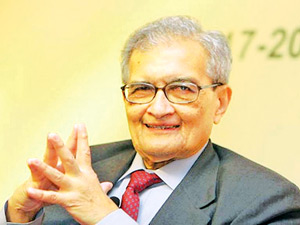Sri Lanka needs political stability
by Tilak Abeysinghe
Although the war is over, without political stability and good
governance Sri Lankan economy is unlikely to settle to a sustained
growth trajectory. Without economic growth and inclusive development the
phoenix of war may come to life again.
 |
|
Amartya Sen |
Singapore's economic architect, Dr Goh Keng Swee, based on his
experience, pointed out that at the developmental stage noneconomic
factors play a much bigger role than economic factors. Among them, he
argued, the role of government is pivotal.
The Nobel laureate, Amartya Sen, reiterated these views by arguing
that good governance, not less governance, is crucial to addressing the
challenges of economic inequality, environmental degradation and
terrorism. The importance of political stability and good governance is
again reiterated in the 2008 Growth Report prepared by the Nobel
laureate Michael Spence on behalf of the Commission of Growth and
Development.
Political stability is what is most needed for Sri Lanka now. The
experience of East and Southeast Asian economies amply demonstrates the
importance of political stability in sustaining growth. Single party
rule over a long period provided the platform for a successful take off
of their economies. The frequent change of power in Sri Lanka between
political parties has created a situation of what the American economist
Mancur Olson called a roving bandit.
The role of the roving bandit is to plunder as much as possible
during his short stay in power without doing anything in return for the
plundered. The problem with a single party rule is that it may become a
stationary bandit. As Olson pointed out, stationary bandit is still
better than having roving bandits around. The stationary bandit has the
incentive to make the pie bigger so that he can plunder more while
keeping the plundered also better off.
Sri Lanka is less likely to settle to a single party rule for a long
enough period for the economy to take off. Given this scenario, an
alternative would be for all the political parties to agree upon a
longterm economic agenda, a blue print, that the ruling party cannot
deviate from without the consent of the other parties.
The objective here is to set the vision beyond a single political
term in office and reduce the engagement of the ruling party in crowd
pleasing activities to win the next election.
Such an agenda guarantees continuity (instead of complete or partial
abandonment of previous party's policy agenda that we have seen in the
past) and keeps room open for branching off to new areas. Obviously the
key ingredients of the long term policy agenda need to be worked out
carefully.
Political stability does not necessarily ensure quality of
governance. Although the leadership matters it is wishful thinking to
wait for a benevolent leader to emerge and set everything right.
In general quality of governance emerges through the type of economic
system and political process in place. Open economy, open to
international trade and investment, is one mechanism that tends to
improve the quality of governance. (In technical terms, quality of
governance is an endogenous variable.) Apart from the experience of the
fast growing East and Southeast Asian economies, the disciplining effect
of economic openness on the formidable bureaucracies of China and India
is quite visible now.
Even the most promising leaders in closed economies have failed to
bring about the changes they desired because of overpowering
bureaucracies. Although the Sri Lankan economy remained opened since
1977, the country could not reap the full benefits of an open economy
because of the war.
It is unwise not to pursue the open economy policies just because of
the uneven impact it had so far on the economy.
Private sector driven open economy does not mean that the Government
takes a hands off approach. Government's heavy involvement in many
sectors, at least until the economy takes off, is essential.
Sri Lanka has inherited from its past one of the best irrigation
systems in the world. Making full use of this and developing the
agricultural sector to create a stable domestic economy that can cushion
the economy from international shocks that are transmitted through the
open economy requires the government involvement and directive. As
Singapore has done it Sri Lanka's successful takeoff lies on a "market
driven guided economy".
As a final note I would like to emphasise that the aim should not be
for faster growth to catch up with others, the aim should be for
sustained growth even at moderate levels. Faster growth comes with a
price. Apart from rapid environmental degradation, it also tends to
degrade human qualities. Sri Lanka stood out as an outlier in the
developing world for its high human development indicators despite being
a low income country. The conflict of course took a heavy toll on the
economy and therefore on social programs. It is now a matter of
reinvigorating this development process that focused more on the quality
of growth.
The writer is attached to the Dept. of Economics, National University
of Singapore.
This article appeared in the Sunday Observer in 2010 |

